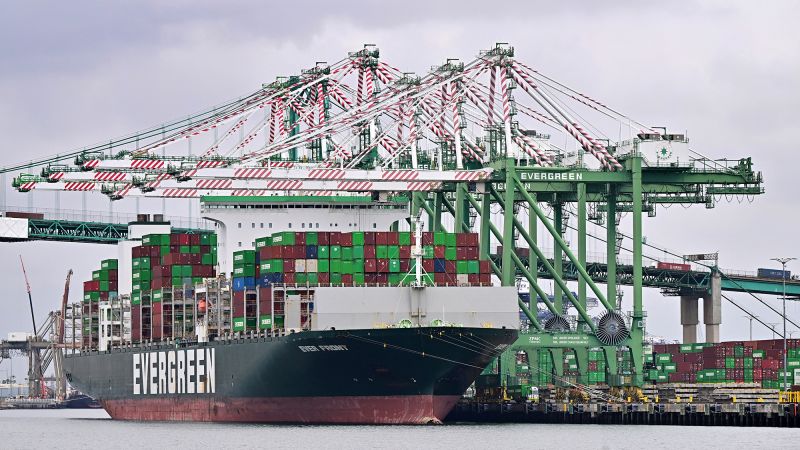- Get link
- X
- Other Apps
- Get link
- X
- Other Apps

Trump's Tariff Fallout: It’s Worse Than We Previously Thought, Says OECD
The Organisation for Economic Co-operation and Development (OECD) has released a sobering report, indicating that the economic repercussions of President Donald Trump's trade policies are projected to be more severe than initially anticipated. The impact is expected to be felt not only within the United States but across the globe.
In its latest Economic Outlook, published Tuesday, the OECD, a group of **38 predominantly wealthy nations**, has significantly downgraded its economic growth forecast for the United States. The 2025 projection now stands at **1.6%**, a substantial decrease from the **2.2%** estimated in March. The report emphasizes the uncertainty and potential for lasting harm stemming from Trump's tariffs.
Several factors contribute to this revised outlook, including:
- Higher Tariffs: Including retaliatory tariffs imposed on American exports.
- Slowdown in Net Immigration: Affecting labor force growth and economic dynamism.
- Sizable Reduction in the Federal Workforce: Potentially impacting government services and spending.
Globally, the OECD anticipates a marked slowdown in economic growth, projecting **2.9%** for both this year and next. This is a downward revision from previous forecasts of **3.1%** and **3.0%**, respectively. These projections are based on the assumption that tariffs worldwide will remain at mid-May levels.
"If everybody starts raising tariffs around the world… we end up with a world in which everybody becomes worse off," warned OECD Chief Economist Alvaro Pereira in an interview with CNN. He emphasized the vital role trade has played in global prosperity, noting that it has been "one of the engines of growth and prosperity" over the last few decades, bringing "close to a billion people" out of poverty.
The OECD report highlights that tariffs and the escalating global trade war have amplified uncertainty in the economic landscape.
“The global economy has shifted from a period of resilient growth and declining inflation to a more uncertain path,” stated OECD Secretary-General Mathias Cormann. “Today’s policy uncertainty is weakening trade and investment, diminishing consumer and business confidence and curbing growth prospects.”
The OECD anticipates that the economic slowdown will be particularly concentrated in the United States, Canada, Mexico, and China – all significantly impacted by the imposition of new tariffs.
Since returning to office, President Trump has increased import duties on various goods from key trading partners, including cars and steel. While his tariff plan recently faced legal challenges, a new round of potentially damaging "reciprocal tariffs" is scheduled to affect numerous American trading partners from July 9, unless a deal can be reached with Washington.
The implementation of these tariffs, along with the resulting unpredictability, is weighing heavily on businesses and consumers.
According to the OECD, the combination of new US import taxes and retaliatory trade barriers from China and Canada suggests "much greater disruption than during the US-China trade tensions in 2018-19," a reference to the trade war during Trump's first term.
The organization cautions that these new levies could lead to increased inflation in the countries imposing them, and recommends that central banks "remain vigilant." This contrasts sharply with President Trump's public pressure on US Federal Reserve Chair Jerome Powell to lower borrowing costs in the United States. Powell has opted to assess the impact of the president's tariffs on the global economy before making any decisions regarding interest rate adjustments.
The OECD's report serves as a stark reminder of the intricate and interconnected nature of the global economy. Trade policies, while seemingly targeted, can have far-reaching consequences, impacting not only nations directly involved but also the overall stability and growth prospects of the world. It underscores the importance of thoughtful and collaborative approaches to trade, prioritizing long-term economic health over short-term gains. The situation calls for careful monitoring and adaptive strategies to mitigate potential risks and foster sustainable economic development for all.
Tags: Trump trade war, global economy, economic growth, OECD report, US economy, tariffs, trade, economic damage, slow growth, forecasts
Source: https://edition.cnn.com/2025/06/03/economy/oecd-economic-downgrade-trump-tariffs-intl
economic damage
Economic growth
forecasts
global economy
OECD report
slow growth
tariffs
trade
Trump trade war
US economy
- Get link
- X
- Other Apps
Comments
Post a Comment